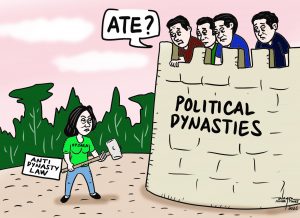With all the talk these days about the plight of our Overseas Filipino Workers (OFWs) and the idea of creating a separate department of government specifically for them, I remembered some personal experiences in hearing about their problems directly from them.
In October of 2017, chapters of the Integrated Bar of the Philippines (IBP) Eastern Mindanao Region, namely the chapters from Davao City, Misamis Oriental, and Bukidnon, as well as members of the Davao Lady Lawyers Association (DALLAS) joined the IBP Central Luzon Region in a Legal Aid Mission to Hongkong to give free legal aid for our OFWs there and, in January of 2018, members of the IBP Davao City Chapter travelled to Singapore also to provide much needed legal services for our countrymen there.
The support we received from our consulate in Hongkong and the embassy in Singapore was overwhelming and, more importantly, the heartfelt gratitude of the OFWs we were able to serve during these missions made all the preparations and the expense very much worthwhile.
More importantly, being able to hear about the plight of our fellow Filipinos working in foreign lands directly from them was an eye opener and, frankly, some of the stories we heard were heart wrenching.
It is difficult to realize the multi-faceted problems faced by our OFWs from afar. Being away from their families, especially their children, for example, is only one of the tremendous burdens they face just for the opportunity to give better lives for their loved ones. Many of them work in unbelievably bad working conditions some akin to slavery, suffer under abusive employers and, worse, there are many who suffer at the hands of their own countrymen, particularly from fly-by-night placement agencies who seem eager to make fortunes out of their blood, sweat and tears while being apathetic to their plight.
Many relatives in the Philippines who are enjoying the fruits of our OFWs’ labors may not realize the great difficulties and harsh life they have to endure just to be able to send money and “balikbayan boxes” back home. Some of them just try and smile through “Bilmoko nyan” and “Bilmoko nito” requests or demands from family members who seem to think that working abroad is like making money off easy street.
While they already face so many problems in the countries where they are, one of the things they are most helpless about is the seeming inability to address legal problems in the Philippines which range from philandering spouses spending their hard earned money on paramours, to trusted family members who embezzled remitted funds.
Being so far away and usually being under long-term contracts, they simply cannot just go home to initiate the proper legal actions to protect their interests and enforce their rights particularly considering the substantial expense of travelling to, and from, the Philippines. Under these circumstances, they usually just decide to suffer in silence through the pain of all this by crying lonesome tears in the night.
This certainly NEED NOT BE THE CASE. Giving our OFWs greater access to our domestic legal system is actually something that our government can do something about at not too much additional cost.
The complaints that they need to file, whether civil or criminal, can actually be prepared and sworn to in our embassies and consulates and then sent to the Philippines for filing in the proper courts or prosecution offices. If need be, legal-aid offices in the Philippines can actually prepare the paperwork and just send it by email for execution in the said offices.
Their main problem of not being in the Philippines to give testimony in support of their complaints is something that can be dealt with through technology that has already been long recognized by our courts.
Rule 10 of the Rules on Electronic Evidence issued by the Supreme Court actually allows the reception of testimony through electronic means. To put it as simply as possible, by filing the proper motion in court, quasi-judicial or administrative body, it is possible for our OFWs to stay in the countries where they are and just testify through Skype, Viber, Facebook Messenger or other video call facilities over the internet.
This is applicable to civil, criminal, quasi-judicial and administrative cases under the said Rules and has been allowed since 2001.
In order to give our OFWs better access to this possible avenue of legal remedies, it would not cost our Department of Foreign Affairs too much to provide the basic facilities for them to testify through electronic means. Basically, this can already be achieved through a laptop with a camera and a microphone or even just a smartphone and a good-enough internet access along with someone who has the basic computer literacy to guide them through it.
In fact, our consulates and embassies should already have these necessary facilities so it should just be a matter of using them for this purpose and making it known to our OFWs that these legal options are available for them to use.
We have long touted the heroism of our OFWs and the great boost they give to our national economy. “Mga Bagong Bayani” we call them. Maybe this is one small way we can help them to ease, even if just a little, their suffering in foreign lands and at least make them feel that they are cared for and that we, as a nation, have their back, so to speak.
Let us give some truth and pride to shouting “MABUHAY ANG MGA BAGONG BAYANI!”



